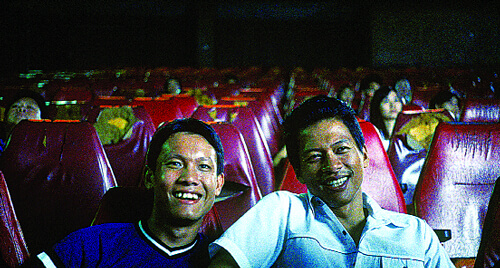A noted Thai director presents an allegorical love story of two gay everymen
In the film “Tropical Malady” by the Thai filmmaker Apichatpong Weerasethakul, Tong (Sakda Kaewbuadee) plays a local civilian in love with an older soldier, Keng (Banlop Lomnoi).
A strikingly unique vision, “Tropical Malady” is one of the strangest love stories ever told on film. A combination of the mundane and mystical, the film is presented in two distinct parts, each with its own title and credits, with each half seemingly derived from its counterpart.
Most directors would consider utterly banal the typical subjects of an Apichatpong Weerasethakul film. A couple enjoying a sex-filled afternoon picnic in the woods is as equally commonplace as it is challenging to film. Nor, is it easy to make a full-length movie about happiness.
Not since Hou Hsiao-hsien’s 1996 “Goodbye South, Goodbye” has a filmmaker made anything as compelling about “doing nothing” as “Blissfully Yours,” Weerasethakul’s second feature, one of the few recent explicitly art films with a positive view of human sexuality.
If the first half of “Tropical Malady” had to stand on its own, it would feel rather slight. A soldier, Keng (Banlop Lomnoi), stationed in a rural area falls in love with a local boy, Tong (Sakda Kaewbuadee). Weerasethakul continues to show the ability to convincingly fabricate small moments of everyday life––cutting ice blocks, taking a sick dog to the vet––that worked so well in “Blissfully Yours.”
Keng and Tong are not the least self-conscious about being a gay couple in a succession of encounters with local people, including benevolent, older women. However, the dialogue has a tone of slight hokum that is too cheerful to last. In a recent issue of “Film Comment,” critic Kong Rithdee points out that Thai audiences laughed at dialogue like “the other day, when I gave you that Clash tape, I forgot to give my heart along with it.”
When Tong licks Keng’s hand halfway through, the film reaches a breaking point. The gesture pushes the relationship in a physical direction that makes both men uncomfortable. Tong runs off, leaving Keng to stare into the darkness.
“The Spirit’s Path,” the second half of “Tropical Malady,” brings Keng back, patrolling a forest for a tiger that’s attacked villagers and their livestock. However, it soon ascends into the stratosphere, suggesting that the tiger is really a shaman trapped in a feline body. A man covered in makeup and paint portrays the animal.
Calling “Tropical Malady” a love story requires some qualifications. Simply put, the second half serves as a metaphor for the emotions underpinning the first half. However, Keng’s relationship to the tiger is far more ambivalent than his attitude towards Tong. The tone of the first half is relaxed and jovial, much like “Blissfully Yours,” while “The Spirit’s Path” is tense and anxiety-ridden. In retrospect, premonitions abound. Animals lurk in the background of many early scenes, and the forest is a constant presence.
“Tropical Malady” is a film about a great passion and encompasses a wide range of emotions. While Keng and the tiger may have a symbiotic relationship, anger and obsession play a large role in it. “The Spirit’s Path” doesn’t simply duplicate the first half’s narrative in symbolic form. Weerasethakul takes an innocent love story as a starting point but expands the subject out to its widest possible radius, exploring poetry and spirituality as well as angst and suspense.
The oddball potency of “The Spirit’s Path” owes a great deal to Weerasethakul’s painterly eye. Some critics have condescendingly suggested that he makes films as if he had never seen anyone else’s. That may be going a bit too far, but some of the freshness of Weerasethakul’s work may stem from his background in the art world and the fact that he cites American avant-garde directors as a major influence. (“Blissfully Yours” has often been compared to Jean Renoir’s “A Day In The Country,” which Weerasethakul says has never seen.
At night, the forest becomes a dreamscape of greens and blacks, lit only by Keng’s flashlight. The colors, altered digitally in post-production, are eerily beautiful. Large portions of “Tropical Malady” are so dark that they’ll probably be indistinct blurs on video, but on the big screen, they’re ravishingly beautiful.
It is hyperbolic to say that “ Tropical Malady” makes all other love stories seem tepid and irrelevant, but the film does make many recent romance films look trivial. As with “Blissfully Yours,” Weerasethakul has taken a seemingly simple topic and treated it with tremendous thought and care, revealing the rich drama underlying aspects of life most of us take for granted.
Who would have guessed that William Blake has a successor in Thailand?
gaycitynews.com


































